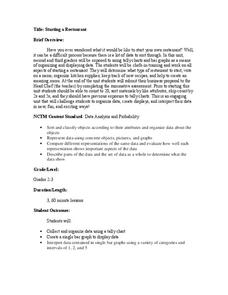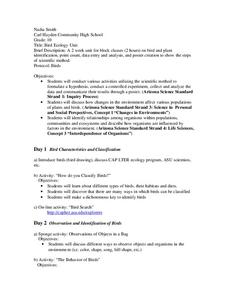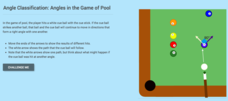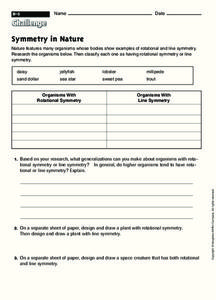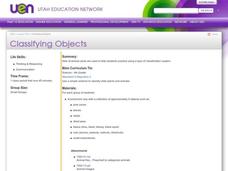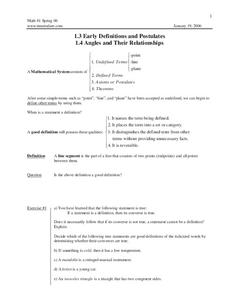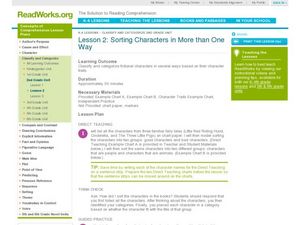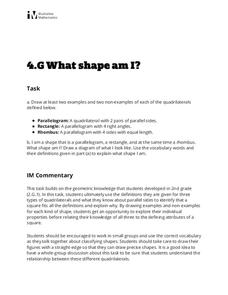Curated OER
Sorting and Classifying
Students explore organization by participating in an object sorting activity. In this classification lesson, students view a diagram which details the different ways to sort items. Students practice sorting random objects in class by...
Scholastic
What's Your Angle?
Identifying types of angles meets real-world application in an excellent, hands-on geometry activity. Learners use pipe cleaners and a visual model to independently discover the acute, right, or obtuse angles in their classroom,...
National Security Agency
Starting a Restaurant
Through an engaging unit, chefs-in-training will sort and classify data using tally charts. Learners will also create bar graphs to display restaurant data and interpret data from bar graphs using a variety of categories....
Curated OER
Classifying Waste: What Kind is Mine?
Students discover what happens to their trash and garbage once it is collected off of the curb. In groups, they classify garbage and waste into seven different categories and estimate how much waste is created in each one. Using the...
Curated OER
Bird Ecology Unit
Tenth graders conduct various activities utilizing the scientific method to formulate a hypothesis, conduct a controlled experiment, collect and analyze the data and communicate their results through a poster. They also identify...
Resources for Early Childhood
Making Math Meaningful and Enjoyable
Your young learners will enjoy mathematics that is meaningful correspondence as they play their way to a deep mathematical foundation. Organized around the math standards, this appropriate sequence of conceptual, preschool...
Curated OER
Creating Groups and Sorting
Students practice classifying. In this classifying and oral language lesson, students listen to the story My Big Truck Book by Roger Priddy and identify similarities between the trucks described. Students sort the children in their class...
EngageNY
More Examples of Functions
Discrete or not discrete? Individuals learn about the difference between discrete and non-discrete functions in the fourth installment of a 12-part module. They classify some examples of functions as being either discrete or non-discrete.
CK-12 Foundation
Angle Classification: Angles in the Game of Pool
Make a game of angle classification. Using the direction of the pool ball, scholars determine the measure of the created angles. They work to create and classify different types of angles throughout an engaging interactive.
Curated OER
Symmetry in Nature
In this symmetry worksheet, students put organisms into categories of having line symmetry or rotational symmetry and answer questions about them. Students put 8 organisms into the chart and answer 3 questions.
Curated OER
Classification And Identification
Students explore diagrammatic and taxonomic keys and their application in the marine sciences. They sort and classify objects and organisms based on visual attributes.
Curated OER
Classifying Objects
Fourth graders work in small groups to sort and classify a variety of objects. They develop criteria for sorting and explain the characteristics they chose for classification. Groups record and share their classifications.
Curated OER
Classifying Shapes Using Venn Diagrams
In this classifying shapes using Venn diagrams worksheet, students draw examples of isosceles, right, and equilateral triangles in the proper sections of the first graphic organizer. They draw polygons, both regular and quadrilaterals,...
Curated OER
Teaching with Collections
Learners examine collections. In these real-world collections lessons, students examine and describe buttons and shells. Learners will then sort, classify, and graph items according to various indicated descriptors.
Curated OER
It's Not All Greek to Me
Learners find out the meaning for prefixes used in math vocabulary. By dissecting words used in everyday math, they figure out what the prefix indicates and what the word means. A variety of well-organized worksheets and activities...
Curated OER
Ecology - Biodiversity Lab
Studnents examine the degree of biodiversity that exists in one's everyday environment, in order to develop an understanding of how scientists classify organisms and to explain why biodiversity is important for living things.
CK-12 Foundation
Identification of Angles by Vertex and Ray
Angle ABC is not the same as angle BCA, but it is the same as angle CBA. Help your classes understand naming conventions of angles and, more importantly, the importance of naming angles correctly. Scholars practice the parts of the angle...
Curated OER
Ornithology and Real World Science
Double click that mouse because you just found an amazing instructional activity! This cross-curricular Ornithology instructional activity incorporates literature, writing, reading informational text, data collection, scientific inquiry,...
Mt. San Antonio Collage
Postulates, Angles, and Their Relationships
More than a worksheet, learners go through geometry topics example by example on the nicely organized handout. From postulates to classifying angles, there are rules and examples provided for each topic. The ten pages of problems...
Curated OER
Sorting Characters in More Than One Way
Introduce your class to characterization. Familiar story characters are sorted into "good" and "bad" categories based on the characters' personalites and actions in the story. The class discusses and describes characters they have read...
Illustrative Mathematics
What Shape Am I?
Sharpen your pencil and grab a ruler, it's time to draw some quadrilaterals! Given the definition of a parallelogram, rectangle, and rhombus, learners draw examples and nonexamples of each figure. The three definitions are...
Blogger
The Real Number System
Classify numbers into their groups with this graphic organizer for the real number system. The printable provides a space for all the categories, with a separate column for unreal numbers.
Curated OER
Design Explorations: Frieze Patterns
Middle schoolers will explore frieze patterns. A frieze pattern is a mathematical concept to classify designs on two-dimensional surfaces, which are repetitive in one direction, based on the symmetries in the pattern. They will explore...
Curated OER
Hardware Sort
High schoolers work in groups to sort and classify a variety of hardware materials commonly found in the store. Students discuss attributes and explain their reasoning for different classifications.


